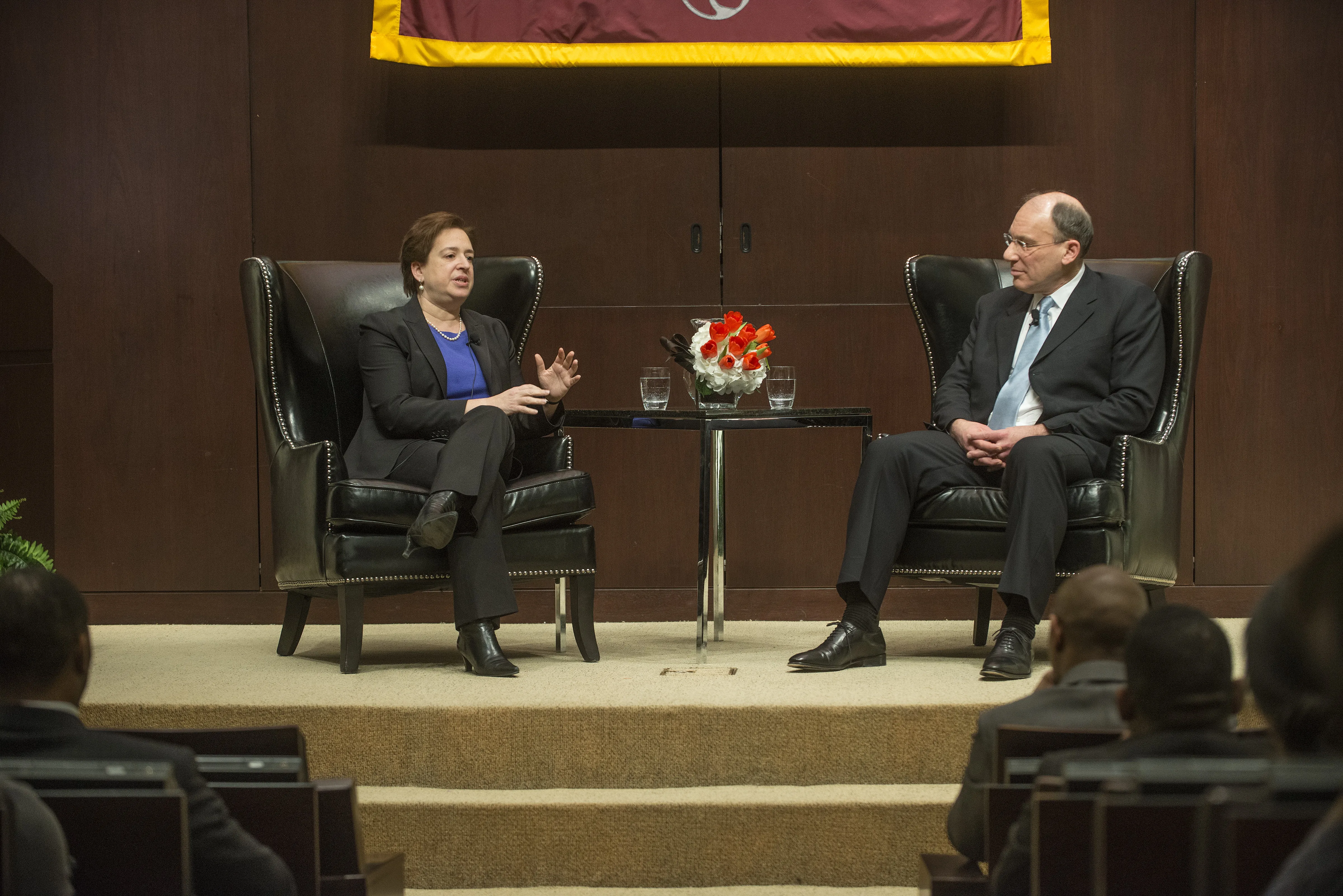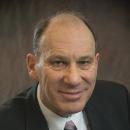Kagan Beats Blizzard to Visit Law School

Teaching law school students and serving on the U.S. Supreme Court have more in common than one might think. Just ask Justice Elena Kagan, who told a packed Law School auditorium that her academic career, which began at UChicago Law in 1991, is what “mattered most” in preparing her for the day-to-day aspects of her current job.
“I would come in in the morning before class, and I would think, how am I going to communicate some complicated set of materials to … people who are interested, engaged, and really smart, but didn’t know everything that I knew?” Kagan said during an hour-long, standing-room-only Q&A led by David Strauss, the Gerald Ratner Distinguished Service Professor of Law. “That process of trying to figure out how to get a person from here to (there) … and how to make those things stick with a person — I feel as though that’s the process I use every time I sit down to write an opinion.”
During a day-long visit that even a blizzard couldn’t stop — Kagan rebooked her flight to arrive in Chicago ahead of the storm — the Court’s most junior justice reflected on decision-making and persuasion, drew laughs as she explained how she and Justice Antonin Scalia became hunting buddies, and offered behind-the-scenes insights on her current job, which she called an “incredible privilege” and “one heck of a good gig.” In addition to taking student questions in the auditorium, Kagan chatted with the faculty over lunch and joined the Constitutional Law class of Professor Geoffrey Stone, the former Law School dean who hired her in 1991.
“It was so interesting listening to her talk about learning to be a justice,” said Elena Moreno, ’16, who attended the class. “It shows that even somebody who is as accomplished and professional as Elena Kagan still needs to do the same kind of fact-finding, and still has a learning curve, when she’s starting a new role.”
Students were surprised by how down-to-earth, conversational, and candid Kagan seemed as she fielded questions.
“I was really impressed with her lack of pretense and arrogance. She's so normal! She has a great sense of humor and is a wonderful story teller,” said Constance Grieves, ’16. “I guess what resonated the most was her respect for the institution of the Court and how well it works. She said that there are disagreements for sure, but that it's nine people who are really talking it over in a sophisticated way and trying to get the law right more than trying to push any other agenda. This perspective is refreshing and reassuring.”
Kagan addressed serious topics, like the quality of Supreme Court representation for criminal defendants, and also drew laughs as she described the changes she experienced after leaving her post as U.S. Solicitor General in 2010 to become a justice. The Solicitor General’s office represents the federal government in cases before the U.S. Supreme Court.
“As Solicitor General, (you spend) 23 hours of every day thinking about how to persuade nine people,” Kagan said. “The only difference now is that I spend the exact same amount of time trying to persuade eight people.”
She offered a peek into that process, noting that “not everybody is persuadable on everything, and there are some things that we do where almost nobody is persuadable.” But in conference, where justices debate and decide cases, the atmosphere is collegial and ruled by long-standing traditions, she said. For instance, justices go around the table one by one, with nobody speaking twice until each justice has spoken once.
“I love the stuff where we can all really engage each other and try to persuade each other and try to get to a better, righter answer based on the materials we have before us,” she said. “I think we do that quite a lot more than people give us credit for, and that’s what I really … love about the institution.”
Of course, it is an institution that is so steeped in tradition that, when she arrived as a justice, Kagan was surprised by how little had changed in the more than two decades since she had been there as a clerk for Justice Thurgood Marshall. Notes are still taken by hand — and as the junior justice, that job falls to Kagan, along with answering the door during conference and serving on the cafeteria committee, she said. Justices rarely communicate by email; instead, they write paper memos that are carried from one office to another.
"When I was Harvard dean, I got 300 emails a day, and they all had to be answered that day. And then when I became Solicitor General, I would get about 40 to 50 a day,” Kagan said. “And now, I'm like, 'Wow! That was an email!'”
‘I’m Not Very Hamlet-like’
Kagan told students that she revels in the legal thinking and writing that comes with being a Supreme Court Justice and loves knowing that she’s making a real difference. She rarely finds herself going back and forth, unable to make a decision.
“I take time, and I think through things … but over time, I come to a decision, and then I’m not a person who is very Hamlet-like,” she told students. “I don’t keep bopping back and forth, and I don’t experience a lot of regret.”
One rare exception involved a First Amendment case — surprising because that is what she’d focused on academically. But sometimes, she said, knowing a topic that deeply is exactly what makes you play out all sides of the argument in your head.
Ruby Garrett, ’16, was particularly struck by Kagan’s emphasis on decisiveness, and by the way that she was able to connect and draw from all of her professional experience — an “extremely helpful” insight that seemed to suggest that there could be multiple paths to the top.
But Garrett had mixed feelings about a comment Kagan made about the quality of representation criminal defendants receive before the Supreme Court.
“Every time one of these cases comes to the Court where the trial lawyer … is doing the first Supreme Court argument, without thinking about the Court, without thinking about the way it operates, rather than giving the case over to an experienced Supreme Court Bar member, I get a little bit upset,” Kagan said.
Garrett said she “loved the emphasis on wanting criminal defendants to have better representation before the Supreme Court” but she preferred a system in which a strong trial lawyer, who has had a case from the beginning, could do well in front of the Supreme Court.
“It should be about how well you know the merits of the case, not how much you know about the Court,” she said. “As a proponent for vertical representation, I’m concerned that focusing too much on experience creates a barrier to access for those lawyers in the trenches that are closest to the case.”
Hunting with Scalia
Several students said a big highlight was hearing Kagan tell how she began hunting with Scalia — a tradition that grew out of a promise she made to an Idaho senator during her confirmation process.
“You do all these courtesy visits with senators. I did about 80 of them — 82, but who’s counting — and you go from office to office to office, and everybody … asks you about the Second Amendment and guns,” she said. But since they can’t ask directly, they use proxies: “Have you ever hunted? Does anybody in your family hunt? Do any of your friends hunt? Does anyone you know hunt?”
After an afternoon of “no, no, no, no,” Kagan was growing a bit punchy. “I’m a Jewish girl from New York City,” she told the students. “This is not what we do on the weekends.”
So, she gave the Idaho senator a different answer. “I said, ‘Senator, this is not an experience I’ve ever had … but if you would like to take me hunting, I would love to come.’ And (there was) this look of total horror. And the White House aide sitting next to me was really about to keel over. So I said, ‘Senator, I’m sorry, I probably went a little far. I didn’t mean to invite myself hunting with you. So, I’ll tell you what: I’ll make you a promise that if I’m lucky enough to be confirmed, I’ll ask Justice Scalia, whom I know to be a great hunter and very avid hunter, to take me hunting.”
It was the only promise Kagan had made during the confirmation process, and it was one Scalia was happy to help her fulfill. “He thought it was hilarious,” she said.
But hunting with Scalia isn’t the only thing that has changed in Kagan’s life since becoming a justice. Now, people stand when she enters a room, they rarely interrupt her, and they “always say yes.”
“People laugh at your jokes, even when they’re not funny,” she said, eliciting laughter from the audience and then adding in response: “Oh, of course.”
But that is why it is so important to her to remain connected to the part of her that is “just Elena” and to work toward staying grounded.
“I think it’s important … not just for justices, but for judges generally,” she said. “I think people do have a sense that when people put on these robes they somehow acquire this mystique, that they aren’t really human beings. It’s good that people think that what we do is good and thoughtful and not just the seat-of-our-pants. The authority that these institutions have is a good thing for our country. … But I think it is important … to keep it from making me a different person than the person I think I am.”

